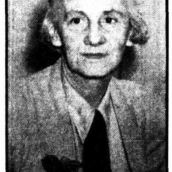
Spoiler Alert
The third novel in Katharine Susannah Prichard’s goldfields trilogy, Winged Seeds (1950) sees her writing about a war which was only just over. It begins brightly in 1936, with vivacious twins turning up on the doorstep of the trilogy’s hero, the aging Sally Gough. Pat and Pam are twenty years old and the stepdaughters of Sally’s arch-enemy, Sir Paddy Cavan. Their visit gives Prichard an opportunity to show us the state of the goldfields at the time. Their flirtatious ways set tongues wagging in Kalgoorlie-Boulder, and a barometer of the sexual mores of the time. Yet the twins are not as easy as they seem; Pam is faithful to her fiancee fighting in the Spanish Civil War and Pat is in love with Sally’s grandson, Bill. They are fiercely anti-fascist, but cannot reveal their true sympathies until they turn twenty-one and inherit their father’s fortune, currently held by their wicked stepfather. Bill is the communist hero of this installment, taking on the mantle from his uncle, Tom, who dies early in the novel, his lungs destroyed by the mine. Bill is torn between his dedication to the cause and his desire for the “siren” Pat.
With various other subplots, there is already plenty enough to sustain an interesting narrative, but as in several other novels of Prichard’s, she unpicks her own set up. The twins leave suddenly; Bill goes off to fight World War Two. The protagonists of the first half only put in guest appearances for the rest of the novel, as the focus returns to Sally, as she struggles with what to make of World War Two, swayed and confused by debates around it, as well as re-living the grief of the Great War in which she lost one son and a second from its after-effects. Bill returns home from Greece injured, only to recover and be sent to New Guinea, where he goes missing, presumed killed by the Japanese. Pat drifts away from her commitment to progressive politics, marrying an American officer. What was the novel building toward in its first half if not for Bill and the twins to do something extraordinary for the cause of communism? There is poignancy, though, in Sally trying to make sense of Bill’s death, and to find transcendence in the midst of death and disappointment.
The trilogy finishes wearily, with the two survivors, Sally and Dinny, burying Kalgoorla, the Aboriginal woman who they have known from the beginning, and finding hope in the winged seeds blown out from the kalgoorluh plant. Sally’s sons were dead, her grandson Billy was dead, but the ideas they lived for were immortal:
The life force strives towards perfection. What other imperative is there in living? The struggle had gone on through the ages. The vital germ in a seed attained its fine flowering and full fruit. How then could the great ideas and ideals of human progress be denied and annihilated? They could not. That was what Bill had believed , and what he tried to make people understand. (379)
Sandra Burchill comments that “… the optimistic vision for the future is not supported by any event in the novel and exists as a contradiction of what the trilogy has defined as a worsening situation both locally and internationally…” (364) The Cold War was a difficult period for Prichard to be writing in. She was a survivor like Sally, and had lived long enough to see more deaths and disappointments than most could bear.
At times the novel shimmers with the intensity and beauty of Prichard at her best. The scene in which Sally confronts her cheating lover, Frisco Jo, is particularly vivid. However, these passages are surrounded by long sections of “reportage”, the broader picture of the conditions of the goldfields conveyed through a session of “yarning” in which characters become mouthpieces for the information (Burchill, 313-314). It is a bold attempt to achieve a bigger canvas, but it is a significant reason why the trilogy was not as well regarded as Prichard hoped.
It is in print with Allen and Unwin, including in digital form; you can also pick up a secondhand first edition for not much more.
Work Cited
Burchill, Sandra. “Katharine Susannah Prichard: Romance, Romanticism and Politics.” PhD diss., UNSW (Australian Defence Force Academy), 1988.






